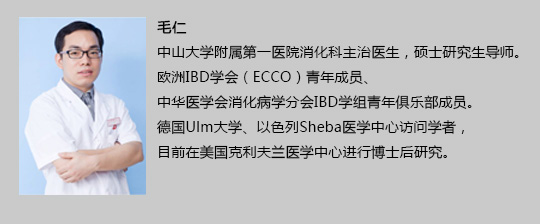消化在线: 炎症性肠病(IBD)达标治疗
来源:
作者:毛仁 曾志荣
作者单位:中山大学附属第一医院

一、IBD达标治疗的起源
达标治疗的定义最早起源于高血压、糖尿病和类风湿性关节炎等疾病[1-2]。以类风湿性关节炎为例,2010年国际相关共识指南已将临床缓解作为治疗目标[3]。鉴于IBD领域的较多观察性研究表明,现有治疗策略并不能改善IBD自然病程—延缓病情进展,而且临床疾病活动指数与实验室指标、内镜学检测等客观指标之间的一致性较低,近年来,越来越多IBD学者提倡和关注达标治疗。基于SONIC研究的Post-hoc分析结果表明,接受硫唑嘌呤和/或生物制剂治疗后,处于临床缓解的患者中,有一半比例的患者存在内镜学或实验室指标(CRP)上的疾病活动[4-6]。
二、IBD治疗“目标”的演变
许多临床研究的Post-hoc分析表明,获得内镜下缓解患者的临床结局要好于取得临床缓解的患者。升阶梯/降阶梯临床研究表明,治疗2年后获得完全内镜缓解(SES-CD=0)是治疗后3年、4年无激素临床缓解的唯一预测因素[7]。深度缓解指临床缓解的同时内镜下缓解,EXTEND研究表明,获得深度缓解患者1年的住院率、手术率明显低于未获得深度缓解者[8]。而ACT-1、ACT-2研究表明,IFX治疗8周时获得粘膜愈合患者,1年结肠切除率明显低于粘膜未愈合者[9]。
2015年,国际IBD研究小组(IOIBD)针对IBD达标治疗,颁布了相关专家共识意见(STRIDE,Selecting
Therapeutic Targets in Inflammatory Bowel Disease)[10]。STRIDE共识推荐UC的治疗目标为临床缓解,同时合并内镜学缓解(Mayo内镜评分0或1),组织学缓解可作为附加目标;而CD治疗的推荐目标为临床缓解+内镜缓解(结肠镜无溃疡),若结肠镜评估不完全或无法达及检查部位的患者,治疗目标为临床缓解+影像学无炎症表现,CRP、粪便钙卫蛋白等实验室指标可作为附加治疗目标。
三、IBD药物治疗浓度监测与达标治疗
1、硫唑嘌呤药物浓度(6-TGN)
早在2000年,Dubinsky等研究表明[11],6-TGN浓度大于235pmols时,临床缓解率较高,这一标准被广泛接受为硫唑嘌呤在IBD中的治疗窗口;然而这一研究数据是基于西方白种人,有关亚洲黄种人的合适6-TGN窗口研究较少。我们的最新研究数据表明,中国人合适的6-TGN窗口可能要低于235pmols。
2、生物制剂治疗药物浓度监测(TDM)
TAXIT研究表明,IFX治疗TDM组(IFX浓度治疗目标3-7ug/ml,根据治疗目标调整IFX剂量)患者的复发率明显低于常规治疗组(根据临床症状,调整IFX剂量)[12]。而在IFX治疗失应答后,根据TDM调整方案较常规IFX加量/缩短间隔方案具有明显的卫生经济效益优势[13]。近年来,有研究表明,IFX药物浓度与粘膜愈合存在一定的关系,因而根据TDM从而获得尽可能高的粘膜愈合率成为学者们关心的话题。Shomron等研究表明,IFX>8ug/ml后,提高药物浓度,并不会增加粘膜愈合率[14]。
四、IBD达标治疗展望
在IBD达标治疗的实践过程中,尚存在以下问题。
1、目前缺乏有关治疗目标为内镜愈合与临床缓解相比,是否能改变IBD自然病程的循证医学证据。正在进行中REACT-2研究,有望为这一问题提供部分答案。
2、治疗目标一直处于动态演变中。比如许多研究表明,获得组织学缓解的UC患者临床结局更好[15-16],组织学缓解也许会成为UC达标治疗的未来目标.
3、达标治疗在临床执行过程中,需要患者、医生等的共同努力,在很多情况下,是治疗上的一种挑战。
4、并不是所有的患者适合同一个治疗目标。对于某些疾病进展缓慢的患者,如果采用达标治疗策略,将会导致这部分患者过度治疗,因此达标治疗的同时,兼顾个体化治疗,是未来发展的必然方向。
参考文献
1. Gaede
P, Lund-Andersen H, Parving HH, Pedersen O. Effect of a multifactorial
intervention on mortality in type 2 diabetes. N Engl J Med 2008;358:580-591.
2. Verdecchia
P, Staessen JA, Angeli F, et al. Usual versus tight control of systolic blood
pressure in non-diabetic patients with hypertension (Cardio-Sis): an openlabel
randomised trial. Lancet 2009;374:525-533.
3. Smolen
JS, Aletaha D, Bijlsma JW, et al. Treating rheumatoid arthritis to target:
recommendations of an international task force. AnnRheum Dis 2010;69:631-637.
4. Bouguen
G, Peyrin-Biroulet L. Surgery for adult Crohn's disease: what is the actual
risk? Gut 2011;60:1178-1181.
5. Peyrin-Biroulet
L, Reinisch W, Colombel JF, et al. Clinical disease activity, C reactive
protein normalisation and mucosal healing in Crohn's disease in the SONIC
trial. Gut 2014;63:88-95
6. Baars
JE, Nuij VJ, Oldenburg B, et al. Majority of patients with inflammatory bowel
disease in clinical remission have mucosal inflammation. Inflamm Bowel Dis
2012;18:1634-1640.
7. Jharap
B, Sandborn WJ, Reinisch W, et al. Randomised clinical study: discrepencies
between patient-reported outcomes andendoscopic appearance inmoderate to severe
ulcerative colitis. Aliment Pharmacol Ther 2015;42:1082-1092.
8. Colombel
JF, Rutgeerts PJ, Sandborn WJ, et al. Adalimumab induces deep remission in
patients with Crohn's disease. Clin Gastroenterol Hepatol 2014;12:414-422.
9.
Colombel JF, Rutgeerts P, Reinisch W, et al. Early mucosal healing with
infliximab is associated with improved long-term clinical outcomes in
ulcerative colitis. Gastroenterology 2011;141:1194-1201.
10.
Peyrin-Biroulet L, Sandborn W, Sands BE, et al. Selecting therapeutic targets
in inflammatory bowel disease (STRIDE): Determining therapeutic goals for
treatto-target. Am J Gastroenterol 2015;110:1324-1338.
11.
Dubinsky MC, Lamothe S, Yang HY, et al. Pharmacogenomics and metabolite
measurement for 6-mercaptopurine therapy in inflammatory bowel disease.
Gastroenterology 2000 Apr;118(4):705-13.
12.
Vande Casteele N, Ferrante M, Van Assche G. et al. Trough concentrations of
infliximab guide dosing for patients with inflammatory bowel disease.
Gastroenterology. 2015 Jun;148(7):1320-9.
13.
Steenholdt C, Brynskov J, Thomsen O et al. Individualised therapy is more
cost-effective than dose intensification in patients with Crohn's disease who
lose response to anti-TNF treatment: a
randomised, controlled trial. Gut. 2014 Jun;63(6):919-27.
14.
Ungar B, Levy I, Yavne Y et al.Optimizing Anti-TNF-α Therapy: Serum Levels of
Infliximab and Adalimumab Are Associated With Mucosal Healing in Patients With
Inflammatory Bowel Diseases. Clin Gastroenterol Hepatol. 2016
Apr;14(4):550-557.
15.
Bouguen G, Levesque BG, Pola S, et al. Feasibility of endoscopic assessment and
treating to target to achieve mucosal healing in ulcerative colitis. Inflamm
Bowel Dis 2014;20:231-239.
16.
Bryant RV, Burger DC, Delo J, et al. Beyond endoscopic mucosal healing in UC:
histological remission better predicts corticosteroid use and hospitalisation
over 6 years of follow-up. Gut 2016
网站声明:本网站刊载内容为内部交流使用,刊载内容仅代表作者个人观点与本网站无关,且不做为任何治疗依据和参考。因刊载内容影响读者相关利益本网站及作者均不负责。 注明来源本网站的文字、图片、视频等资料,版权归网站所有,著作权归作者所有。非经授权,任何媒体、网站或个人不得转载,授权转载时须注明来源。本网所有 转载文章系出于传递更多信息之目的,且明确注明来源和作者,不希望被转载的媒体或个人可与我们联系,我们将立即进行删除处理,因作者导致的版权侵权由作者 承担全部责任。所有活动最终解释权归医学顾问网所有。特此声明!